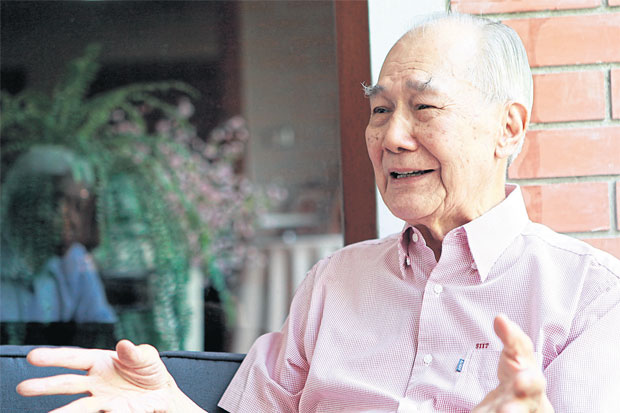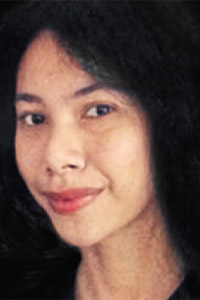
Former prime minister Anand Panyarachun gave a speech on Thai democracy at the Foreign Correspondents Club of Thailand on March 23. The following is an abridged version of the Q and A session.
If you were to become prime minister again, what would you consider to be the most important and pressing issue?
Nobody has so far made me an offer ... that I cannot refuse. In past decades, Thailand used to be known as a peaceful country, serene, compassionate, loving, easy-going. Of course, we have never been successful in striving for real democracy but, despite that, people lived happily. We complained all the time, we fought verbally, but nothing happened to us. The situation then degenerated.
Never before have the Thais, at least not in my generation, seen such polarisation, real division, hatred and vengeance which brought about violence and killings.
Being older, I have seen ups and downs in my own personal life and in history but I have never felt disenchanted with my country and I always had this hope that we would muddle our way through. But in the past five or 10 years, we have been at a total loss.
The results have not been entirely satisfactory but it brought a certain level of peace and order.
Still, challenges lie ahead of us. To have power is not that difficult — whether through elections or through a military takeover — what is difficult is how to run the country. Elected or non-elected governments face the same issues.
Thais need to adjust their values. This is not a winner-takes-all situation, and there is no winner or loser. Real democratic values are how to reach a consensus, how to tolerate other people. These are the core values that we have not tried to learn or to emulate, or understand.
Of course, other challenges exist in Thailand. There are problems such as poverty, inequality, unequal access to income or opportunity, but these exist in other countries too, whether developed or developing.
However, if we can’t resolve our political dispute peacefully, I don’t see Thailand making much progress in other areas.
You governed Thailand after a coup and your government wasn’t an elected government. Yet, you gained high popularity from Thai society at the time. What made your government different from this government?
As a rule, I refuse to compare my government with any other governments in this country. I think what I personally tried to achieve at that time, even before aspiring to resolve some of the country’s problems, my priority was “what could I do to gain the trust of the Thai people?”
I made every effort, in fact, every day, to engage with the Thai people, to earn their trust and their confidence. I believe that in positions of power, if you don’t have the trust of the people or if the people have no confidence in your integrity, it’s going to be very difficult to govern.
Throughout my life as a civil servant or in politics, I laid out issues and plans, policies. However, the most difficult task of any CEO, prime minister or state secretary, would be management of human resources — management of people. If you overcome that problem, other issues become much simpler and easier.
The most recent coup seems to have shaken investors’ confidence to a certain degree — perhaps because of the uncertainty of how long things are going to be in this state. This comes at a time of increasing competitiveness with some of Thailand’s neighbours. How concerned are you about Thailand’s international competitiveness in the region?
The Western media or many Thais come to a wrong conclusion. Thais coups d’etat are normally bloodless and non-violent. They don’t deteriorate investment.
The bomb at the Erawan shrine did. People have to learn to understand that when they talk about coups d’etat, they don’t talk about a coup d’etat in Africa or Latin America, which are often bloody, violent and brutal.
I’m not proud to say that in 83 years of so called constitutional monarchy, that we have had 19 constitutions. I’m not proud of that. But the actual damage done to lives and property is relatively insignificant. However, we regretted the losses of lives and damage of property.
We have to make a distinction between a coup d’etat in Thailand and in Africa or other countries.
Or it doesn’t have to be a coup d’etat, it can be a war in Iraq or wherever else, where there is a regime change.
I think Thailand is not that competitive but it has little to do with the coup d’etat but rather with education. It has to do with the lack of skill-training.
Are the ideas and reforms you have suggested possible to carry out under a military government?
I don’t know, I haven’t talked to them. I’m sure that some of them would follow these statements or read it. If they like it, they can pick it up point by point. It’s up to them. I’m an outsider. I’m not in the business of advising people or making recommendations to people in power, that’s not my style. However, I speak loudly. And honestly. I have no direct or official dealings with the government.
You talked about social division in Thailand and the unequal distribution of wealth. An article in The Economist states that 1% of Americans own 50% of all the wealth in America. The same article states that 0.1% of the Thai people own more than 50% of everything in Thailand. If these numbers are true, how can Thai leaders expect there not to be social division in Thailand? If these were the figures in my country, Norway, there would be a civil war.
It’s not possible to say whether the figures you quoted are accurate. I have to stress however that every society has its own problems. The phenomenon, however, is not unique to Thailand. It is a common phenomenon.
Whether you have democracy or a capitalist system, I don’t know which system could respond to this problem most effectively, except for countries with a lesser population.
To me, discrepancy of income is not the root cause. The root cause is inequality, inequality of rights — be it economic, legal rights, political rights. Where there are no rights, there are no opportunities.
When I spoke in Belgium about democracy, I spoke about the principles of democracy in general terms. Here, I narrowed it down to four elements, relevant to Thailand. Sustainable and widespread economic development. That particular element is addressing the issue of economic inequality. With all the benefits of globalisation, the major merits still go to the richer people and very few merits go down to the lower levels.
If we have sustainable and widespread economic development, that means more equitable development, that is the way to address the issue of economic inequality. If we can reduce economic inequality, then more people at the lower level will gain more and have higher income and that will decrease the existing discrepancy.
An open and inclusive society can address the issue of inequality of rights. You bring more people to participate in the decision-making process. You actually reinforce the rights of the common people. That also addresses the issue of inequality of rights. The rule of law addresses the issue of legal inequality. In many countries, there is no such thing as equal justice and the law.
Calibrating the balance of power between the state and the people addresses the issue of power relationship. At the moment, in Thailand and other countries, the power of the state is overwhelming and overwhelms the little power that people have, unless you recalibrate that balance of power. Otherwise, there will be no way of achieving equality. Discrepancy in income is not the root cause.
When you became prime minister, the US was critical of the coup and discontinued the USAID programme. The US did it again this time. Do you see a decrease in foreign policy of the US, when China is much more dominant?
I have never been a strong advocate of the United States military presence in Thailand or in Southeast Asia. I think I recognise the good nature of the American people but many Thais make distinctions between the people and the government. However, through some of the US government policies in the past vis a vis this region, Africa or Latin America or Europe, people can see double standards in US policies.
Thais of my generation would remember with gratefulness the good deeds done by the Presbyterian missionaries in setting up schools and hospitals and the printing press. We recognise the good intentions. But when it comes to assuming the role of a superpower, their conduct has not been exemplary. I would prefer that they would recalibrate their policies to fit the current geopolitical scene.
To think China is going to compete with America sounds absurd to me. America has the largest armed forces in the world, the largest military expenditure.
I don’t believe that countries in Southeast Asia are forced to choose between siding with China or siding with America. Just because we had a coup d’etat, which happens in other areas of the world too, you suspended US$2.5 million in military aid? The same happened in Egypt but you continued to supply them on an annual basis US$2.5 billion?
Yes, we welcome American influence and their presence but they have to be more sensitive to other people’s views. Their acts and their decisions have not been so consistent.
How can we have the rule of law when over the decades, many educated men and women, yourself included, are willing to work with men with guns who mistake the rule of law for the rule by law or by gun? Where do we draw the line for this vicious cycle and where do we draw the line when working with the military regime is counter-productive?
The weakness of the Thais is that we often look at things in black or white terms, “this is bad — absolutely bad”. Or, “this is good — absolutely good”. In real life, there is no such thing as absolute white, black or absolute military. In real life, you have to deal with the idiosyncrasies of life.
I do not support the coup d’etat but it would be stupid to say that I’m against military dictatorship under any circumstances and at any time. To be working with them is a different matter and has nothing to do with the rule of law. If a civilian didn’t step in, we would be heading towards disaster.
Ariane Kupferman-Sutthavong, a news reporter at the Bangkok Post, transcribed this Q&A session.
